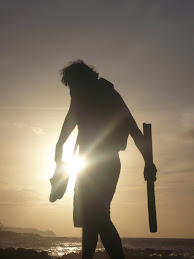Opening ceremony with the Governor of Ulgii soum, the region's 'State' Representative, and none other than Dr. Beket (who showed up just after our 9am scheduled start with the other two in tow). The customary speeches of acknowledgment, goodwill, and best wishes were given, and there were even some representatives of the other NGOs working in Ulgii City, bearing gifts and more well wishes, and even sending along representatives to attend the training (if they sent this guy all the way from Australia, then he must have something worth sharing).
Photo: The Governor gives us his blessing.
To our surprise, Dr Beket joined the class and stayed for the entire day, quizzing me over lunch (potato-pickle salad, meat dumpling soup with cabbage, potatoes, and carrots, and a Kazakh version of a hamburger pattie drowned in brown gravy served on steamed white rice; enough food to send everyone into food-induced comatose for the next ten sessions) about the vast Aussie sheep and cattle ranches he had heard about, and how the heck (and why bother anyways) do they fence in their grazing areas (some of which are bigger than the American state of Texas)?
We have a conversation (through Bek) about the state of agriculture in the developed world, the destructive consequences of modern conventional agricultural techniques, and of the need to be wary of 'science' and 'expertise' that is being given by a person whose livelihood depends upon the advice being Normal 0 false false false MicrosoftInternetExplorer4 Introduction to PermacultureEthics
The first day is as much a sales job (these students are NGO staff being paid to attend vs. paying students hungry & searching for the information), as it is where we set up the context for the entire course. People anywhere in the world can usually spot a fake a mile away, and if there is no value shown in the beginning sessions than the potential to lose control of the class is high.
Apparently, we are doing alright because everyone manages to stay conscious for the last two sessions (Attitudinal Principles and Design Principles part I), even showing up early and staying a half-hour overtime to complete the day's final lesson on the Needs/Functions/Products analysis.
Photo: Dr Beket and Guest (in background).
Photo: Doc and Tileubek Kapu.
Photo: Altangerel (ADRA) and Gulia (World Vision).


I'm so impressed and inspired by your work. I'm a permaculture enthusiast (w/PDC) and have long been fascinated by Mongolia, so you're right at a very interesting edge/intersection for me. I was actually inspired to apply to the Peace Corps based on those two interests, and am working my way through medical clearance now. Unfortunately, Mongolia is probably not an option for me because they are focused on bringing in English teachers. But if you happen to talk to anyone related to Peace Corps, tell them there's someone in the pipeline now that would LOVE to work with them on permaculture.
ReplyDeleteThe culture there is so rich, there is so much that could be learned from the elders and the land there. But soon it will be too late.
Sain Bain O Terrie,
ReplyDeleteI could not agree with you more.
We may be able to work together to find you a placement in Mongolia outside of the Peace Corps (whose office is perhaps coincidentally 2 doors down from ADRA in Ulaanbaatar)... keep in touch and send me a messaage at theGreenBackpack [at] gmail [dot] com, after Mar 22 if you are interested.
Thank you for reading!
~TGB